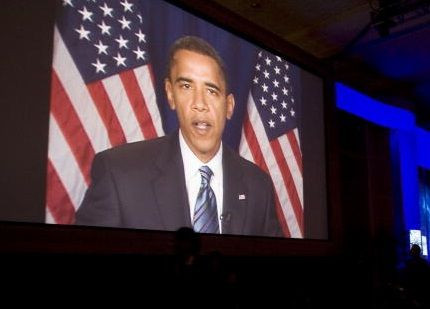The Cable Industry Wants President Obama To Stay Out Of The Set-Top-Box Debate

The cable industry wants President Barack Obama to butt out of its business — and stay out of your living room.
The battle for the future of channel-surfing heated up Friday when the Obama administration urged the Federal Communications Commission to open up cable set-top boxes, a move supporters say would allow third-party companies to improve the TV experience for viewers by releasing the stranglehold the cable industry has over how programs are packaged.
Consumers pay an average of $231 a year in cable-box rental fees, according to an FCC estimate, in part because cable and satellite operators don’t allow third parties to access their programming feeds. Tech companies such as Amazon and Google are developing products that would make the TV-viewing experience more user-friendly and make channel-surfing more akin to web surfing.
In an interview with Yahoo Finance on Friday, Obama said more competition among box-makers will benefit consumers. “That’s the way the free market works,” he said. “The more competition we have, the more products, services, innovation takes place.”
Not surprisingly, Big Cable is having none of it.
Michael Powell, president and chief executive of the National Cable & Telecommunications Association, an industry trade group, accused the White House of injecting “politics and inflammatory rhetoric” into a regulatory process that had already been moving along without the president’s help. The FCC, which supposedly operates independent of the federal government, proposed new rules for set-top boxes in February.
“Consumers and regulated companies have the right to expect decisions affecting their businesses are made based on sound analysis of the record and not the political interests of the executive branch,” Powell wrote in a blog post Friday. “To see the White House take political credit for the actions of the ‘independent’ agency and direct it to reach a specific conclusion even before the record has been assembled, shatters that faith and undermines the Commission’s credibility.”
Walter McCormick, president of USTelecom, agreed. “The Obama administration’s disregard for the integrity of the rulemaking process is appalling,” he said in a statement. “There is no need to mince words. When the president ‘calls upon’ his appointees and an agency chairman who serves at his pleasure to act in a particular way, he is ‘directing’ them, and all credibility in the independence of the agency and trust in the administrative process evaporates. The legitimacy of this rule-making proceeding has now been irreparably compromised.”
Even without the president’s input, the FCC’s proposal has already courted a groundswell of criticism and pushback. Pay-TV providers say being forced to open up their programming feeds to Silicon Valley tech giants violates their intellectual property rights, exposes them to piracy and runs afoul of the hard-earned licensing deals they have hashed out with media companies, many of which are contingent on where specific channels appear in a programming lineup.
Moreover, according to some free-market advocacy groups, competition in the set-top-box market will eventually become a moot point as more and more consumers access programming through apps.
“It’s as if the White House deliberately put on blinders so as not to see how rapidly new independent online-streaming services and devices are proliferating,” Randolph May, president of the Free State Foundation and a former counsel to the FCC, said in a statement Friday.
The president’s call to the FCC is part of a broader initiative aimed at spurring consumer choice through an executive order, one that calls on government agencies to address specific bottlenecks to competition. Under the order, the agencies will be required to report back in 60 days to discuss their progress.
Christopher Zara covers media and culture. News tips? Email me. Follow me on Twitter @christopherzara.
© Copyright IBTimes 2025. All rights reserved.





















